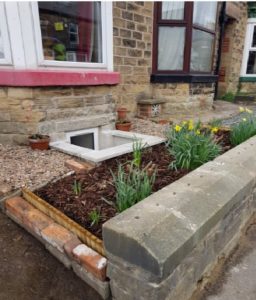If you are thinking of making use of the basement space below your home in Sheffield with a conversion, then LABS Basements and Damp Proofing has provided this blog to offer up some key things to consider. Here we will walk you through the key things you need to know before you embark on your basement conversion. We will be going over the practicalities of basement conversion, the British Standard (BS8102) concerning basement conversion, and building regulations. We will also explore examples of works we have undertaken, and the property value increases you can expect after converting a basement.
Building Regulations
One of the essential things to consider when undertaking a basement conversion, is the building regulations that you must comply with in order for the space to be legally habitable. The code of practice (BS8102) for protection of below ground structures against water from the ground’ outlines the industry recognised best practices for dealing with and preventing the ingress of water.
BS8102 Covers:
- The use of waterproofing barrier materials applied to the structure
- Structurally integral watertight construction
- Drained cavity construction
BS8102 also provides guidelines for the evaluation of groundwater conditions, risk assessments, and the options that are available to you in regard to the drainage of water outside the structure.
There are also a number of regulations you must take in to consideration if you wish for your converted basement space to be legally habitable, these are things such as:
- Achieving the proper levels of insulation.
- Creation of a proper basement means of escape.
- Having a minimum ceiling height, which many older properties will not meet by default, and will therefore have to be dug down.
- If any structural work is to be undertaken: Ensuring that the correct structural supports are in place, and that it has been signed off by an inspector.
Deciding on a Use for Your Basement Space
There are two different methods of converting a basement space, and these will differ slightly in specification and cost, depending on what you intend to use the basement for. The most cost-effective means of basement conversion would be to build a simple utility room with no windows. You could use this for a number of things, such as: a workshop, a wine cellar, storage or even to grow plants indoors. With a little extra funding and work put in to electrical and plumbing works, you could upgrade the space to be used as a personal gym, or games room.
If you intend for the basement conversion to be used as a habitable space, such as an office, kitchen or bedroom, then you will have to include a lightwell. A lightwell is key for creating a quality habitable basement conversion, and should be built in a way that maximises the amount of daylight received.
Some ways to maximise light are:
- Multiple lightwells: Specifically, on southern facing elevations.
- A sunken court-yard: With glass doors as a means of access to the basement.
- An open plan layout: This will allow light to travel throughout the basement.
- Flat rooflights: Where a basement extends beneath a garden, can be a great way to bring in natural light.
- Colours and Lighting: A well thought-out lighting scheme is essential in ensuring your basement space is properly lit, in conjunction with neutral and natural colours, this can enhance the light and brighten up the space.


Tips for Cellar Conversion
There is a lot to consider when undertaking a basement conversion. Below we will outline some of the things that we at LABS, think is important to keep in mind.
- Ensure the person quoting you is adequately qualified: If the person is a member of the Basement Waterproofing Association (BWA) and/or the Property Care Association (PCA) then you can rest assured that the person is knowledgeable in this field. They should also be educated and proficient in the application of the aforementioned BS8102.
- Water pressure WILL come to bear on the structure: Even if you consider your basement space to be dry, BS8102 asserts that we must assume this. With the space being below ground, it means it is susceptible to naturally changing water tables, leaks and flooding. A failure to consider all the eventualities can lead to unwanted extra costs, and a lot of inconvenience due to the whole system potentially having to be dismantled and replaced.
- Insurance backed Guarantees: It is essential when undertaking a basement conversion, that you go with a company who can provide you with an insurance backed guarantee, so that in the event that any of the systems fail, your home will be protected. Usually these guarantees are backed for 10 years and tend to cost around 5% the price of the overall project. This is definitely worth it, as not only are you protected in the event of a system failure, it will also raise the value of your property and give you peace of mind. We at LABS Basements and Damp Proofing can provide the client with the assurance of an insurance backed guarantee should you require one.
- For more, see our 5 Top Tips for Cellar Conversion
Contact us today on 01142 302865 or visit our website @ www.l-a-b-s.co.uk for more information.

